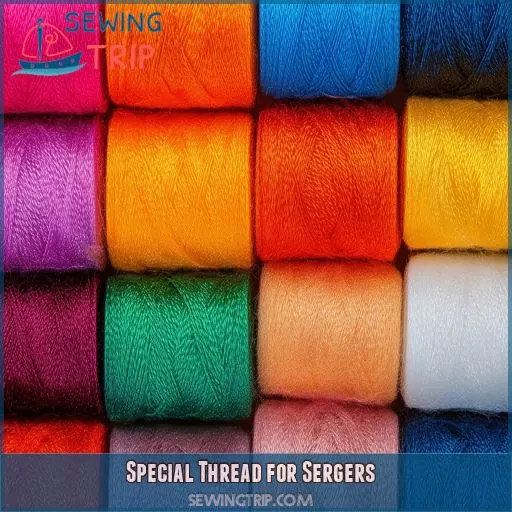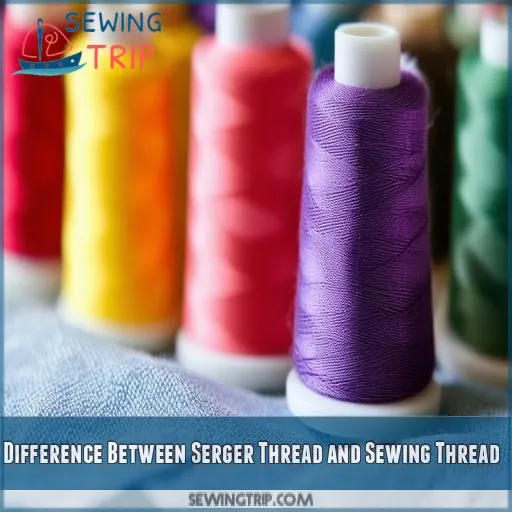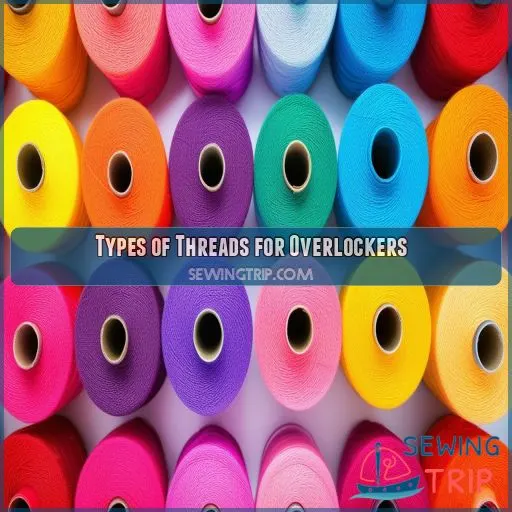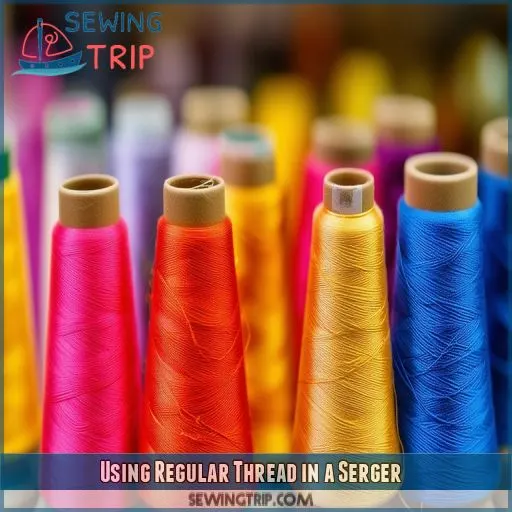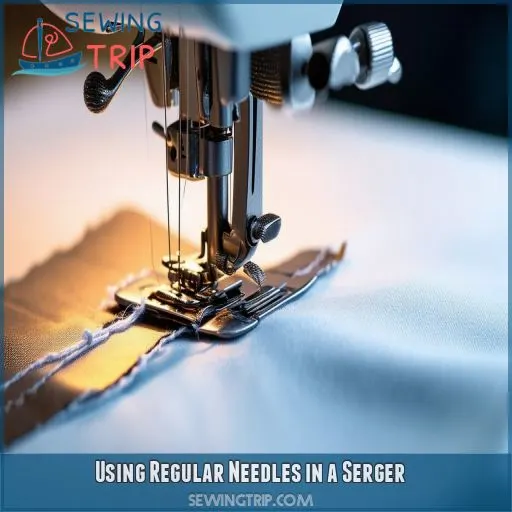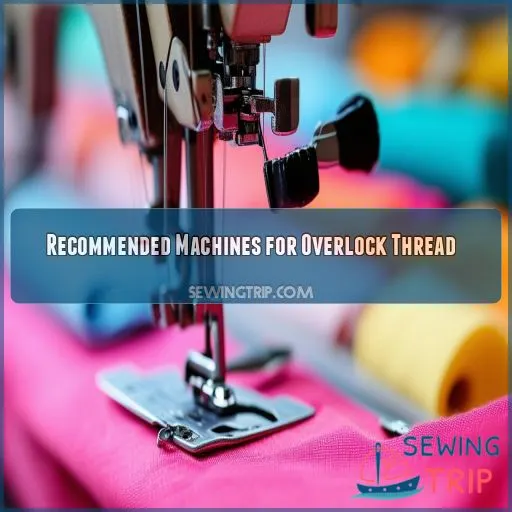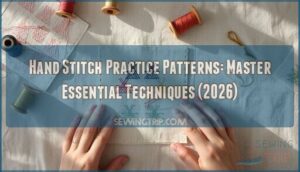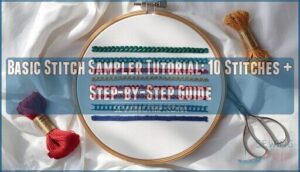This site is supported by our readers. We may earn a commission, at no cost to you, if you purchase through links.
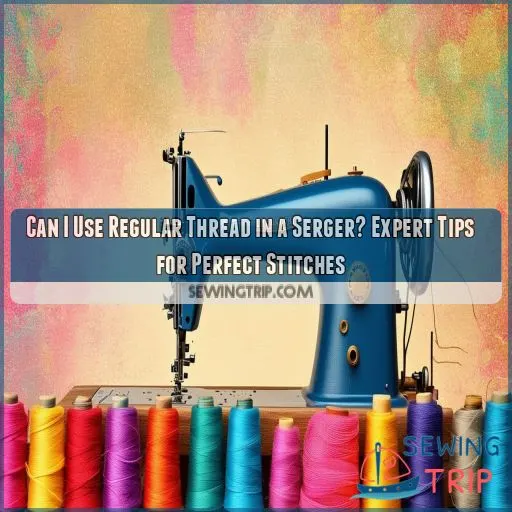
We will take a closer look at the details that distinguished serger threads from sewing threads. We’ll consider whether or not regular thread substitution is possible with your serger while still obtaining flawless stitches. Knowing your threads—both types and applications—and the specific requirements for certain machines will make you much more confident in terms of sewing, ensuring every seam stays strong and secure.
For those craving mastery and innovation in their craft, let’s unravel this topic.
Table Of Contents
- Key Takeaways
- Can I Use Regular Thread in a Serger?
- Special Thread for Sergers
- Difference Between Serger Thread and Sewing Thread
- Types of Threads for Overlockers
- Using Regular Thread in a Serger
- Using Regular Needles in a Serger
- Recommended Machines for Overlock Thread
- Frequently Asked Questions (FAQs)
- Conclusion
Key Takeaways
- Using regular thread in a serger is like trying to put a square peg in a round hole – it just doesn’t fit right.
- Serger-specific threads are made for speed and precision, so you can stitch like a pro.
- Don’t be a cheapskate when it comes to thread – using the right stuff makes all the difference in the quality of your seams.
- If you’re in a pinch, you can use regular thread in your serger, but be prepared for some tension issues and poor stitch quality.
Can I Use Regular Thread in a Serger?
Can you use regular thread in a serger? Well, I wouldn’t recommend it.
Serger thread is specially designed for the high speeds and tension needs of overlock machines. Regular sewing thread is thicker, denser, and won’t play nicely with your serger. If you try to use it, you’ll likely end up with tension issues, poor stitch quality, and even thread breakage.
Stick to overlock thread – it’s thinner, smoother, and made to glide through your serger like a dream. Sure, it might cost a bit more, but trust me, it’s worth it for those professional-looking seams.
Want to learn more about choosing the right thread for your serger projects?
Special Thread for Sergers
If you use a serger, you’ll want to use thread that has been made specifically for sergers. Serger thread is designed for high stitching speeds and created to meet the special tension needs of overlock machines. Serger thread is thinner and smoother than regular sewing thread; therefore, it can go through your machine mechanisms without a hitch.
Proper care of your thread will keep your serger humming. Keep your serger threads out of direct sunlight in a cool, dry place to avoid weakening or tangling. You’ll be surprised at the rainbow selection of serger thread colors available that will allow you to match or contrast with your chosen fabric perfectly.
Some of the more popular brands include Maxi-Lock, Gutermann, and Wooly Nylon. There are surely overlock thread substitutes out there, but to have maximum seam strength and great performance, it’s best to stick with the real thing when using your serger. Keep in mind that speed and precision require proper tools!
Difference Between Serger Thread and Sewing Thread
Now that you know a thing or two about serger thread, let’s unroll what really makes serger thread different from regular sewing thread. You’ll find these two aren’t cut from the same cloth!
Serger thread is specifically designed for overlock sewing machines. It’s thinner and more flexible than regular sewing thread, flowing easily through the tensions of your serger. The characteristic effectiveness of this sewing thread type is in making these professional, durable seams you have grown to love.
In contrast, regular sewing thread is more dense and heavy. It’s perfect for building clothes, but far too thick for your serger. It will only give you tension problems and bad stitches on your overlock machine.
While they can both be useful in your sewing arsenal, they aren’t interchangeable. Stick to serger thread for your overlock projects; those seams must stay strong and look fantastic!
Types of Threads for Overlockers
If you have a serger, you’ll likely want to use the appropriate thread to produce the best results. Overlock thread is designed for sergers and has some special properties and uses which set it apart from ordinary sewing threads.
Overlock Thread Characteristics
Unlike regular thread, serger thread has special features that make it the best for use in your overlock machine. It’s thinner and smoother to easily glide through the tension discs.
When choosing serger thread, consider color, quality, and gauge to give you strong and neat seams on various fabrics.
Proper storage will keep the threads from tangling and maintain their integrity.
Overlock Thread Applications
You’ll find overlock thread applications versatile and essential for your serger projects. This specialized thread creates strong, flexible seams and finishes edges beautifully. Here’s what you can do with overlock thread:
- Secure raw edges to prevent fraying
- Create decorative stitches for unique designs
- Join stretchy fabrics without breaking stitches
Difference Between Overlock and Regular Thread
You’ll find key differences between overlock and regular thread. Let’s break it down:
| Characteristic | Overlock Thread | Regular Thread |
|---|---|---|
| Strength | Weaker | Stronger |
| Plies | 2 | 3 |
| Elasticity | More elastic | Less elastic |
| Applications | Limited | Versatile |
| Price | Generally lower | Varies |
Using Regular Thread in a Serger
Now that we’ve explored the various types of threads for overlockers, let’s tackle a common question: Can you use regular thread in a serger? While it’s tempting to reach for your standard sewing thread, it’s not the best choice for your serger. Here’s why:
Regular thread isn’t designed to withstand the high-speed stitching of sergers. It’s thicker and less smooth than serger thread, which can lead to tension issues and poor stitch quality. You’ll likely encounter more lint buildup and thread breakage, too. However, if you’re in a pinch, you can use regular thread as a temporary substitute. Just be prepared to make some adjustments.
To use regular thread in your serger, you’ll need to:
- Loosen the tension
- Slow down your stitching speed
- Use a larger needle size
Using Regular Needles in a Serger
If you’re going to use regular needles on your serger, beware. It’s usually tempting to use just any needle, especially when making a choice can make all the difference in your project. Here’s what you need to know:
- Thread tension: Regular needles can’t perform as well at higher tensions in sergers.
- Needle type: Use serger-specific needles designed to stitch at high speeds.
- Fabric weight: Match your needle size to your fabric for best results.
• Stitch length: Serger needles are created for shorter stitch lengths.
Recommended Machines for Overlock Thread
Now that you’re acquainted with serger needles, let’s take a gander at the machines that are going to make these overlock dreams of ours a reality. On the topic of overlock thread machines, there are some really stellar options available out there:
The Singer Cutting S0230 four-thread overlocking machine is a workhorse for a wide array of fabrics. If it’s a versatile model you need, then look no further than the Singer Pro-Finish 14CG754 2-3-4 overlocking machine. For those valuing precision, there’s the Juki 1 Needle 3 Thread overlocking machine. Need portability? The Juki MO644D portable overlocking machine has your back. Tired of hassles with threading? The Bernette 64 Airlock air threading overlocking machine changes everything.
These machines are designed to handle overlock thread durability, accommodate big spools, and work with a wide variety of threads so that all your overlocking applications can be achieved.
Frequently Asked Questions (FAQs)
Do you need special thread for a serger?
Yes, you need special thread for a serger. Regular thread is too thick and can lead to tension issues, lint buildup, and weak seams. Serger thread is finer, smoother, and designed specifically for these machines.
What is the difference between serger thread and sewing thread?
Serger thread and sewing thread differ in their construction and intended uses. Serger thread is thinner, smoother, and more flexible to glide easily through the serger’s intricate mechanisms. Regular thread lacks the specialized properties to perform well in a serger.
Can I use any thread for overlocker?
You’d probably stumble upon weaker seams if you used any thread for an overlocker. Overlock thread, specifically designed for overlock machines, provides strength and flexibility, ensuring better durability and performance in your sewing projects.
Can you use regular needles in a serger?
You can use regular sewing thread in a serger, but it’s not recommended. Regular thread is thicker and may cause tension issues or thread breakage. Serger thread is designed specifically for overlock machines, providing smooth, tangle-free performance.
Can serger thread cause issues with sewing machine warranties?
Mixing things up, using serger thread in your sewing machine might void the warranty. Its weaker composition can strain the machine, leading to potential issues. Stick to regular thread to keep your warranty intact and avoid headaches.
How does humidity affect serger thread tension?
High humidity can cause serger thread to swell, leading to increased tension and potential thread breakage. Adjust your tension settings and keep your thread in a dry, controlled environment to mitigate these issues effectively.
Is serger thread suitable for hand sewing applications?
Serger thread isn’t ideal for hand sewing due to its thinness and tendency to tangle. It’s designed for overlock machines, providing flexibility and strength, but doesn’t offer the durability needed for hand-stitched seams.
Will serger thread work well for sewing buttonholes?
Using serger thread to sew buttonholes isn’t so good. It’s finer, smooth and tangle-free characteristics make it less strong for the same purpose as the buttonhole. Use regular thread for best results and for you to have strong, durable, professional looking buttonholes.
Does serger thread have the same colorfastness as regular thread?
Serger thread generally doesn’t offer the same colorfastness as regular thread. It’s designed more for flexibility and durability rather than long-term color retention. Always test serger thread colorfastness for projects where it’s critical.
Conclusion
As the saying goes, "The right tool for the job ensures success."
Knowing if you can use regular thread in a serger or not is important for perfect stitches. Regular threads might do the trick, but serger-specific threads perform way better. Knowing what makes one thread particular and when to use them will beef up your sewing projects.
Use appropriate threads and needles on your serger, and you’ll have mastered the craft of producing professional seams quickly.

